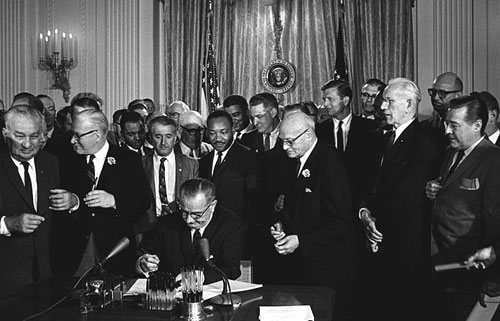
On July 2, 1964, President Lyndon Johnson signed the Civil Rights Act, a historic advance for all Americans.
It includes the following landmark provisions:
Title I bars discrimination in voter registration requirements.
Title II outlaws discrimination based on race, color, religion or national origin in hotels, motels, restaurants, theaters, and all other public accommodations engaged in interstate commerce.
Title III prohibits state and municipal governments from denying access to public facilities on grounds of race, color, religion or national origin.
Title IV encouraged desegregation of public schools and authorized the U.S. Attorney General to file suits to enforce it.
Title VI prevents discrimination by government agencies that receive federal funds.
Title VII prohibits employment discrimination based on race, color, religion, sex and national origin.
Title VII also prohibits discrimination against an individual because of his or her association with another individual of a particular race, color, religion, sex, or national origin. An employer cannot discriminate against a person because of his or her interracial association with another, such as by an interracial marriage.
Photo: President Johnson signs the Civil Rights Act, July 2, 1964. Standing behind him is Dr. Martin Luther King Jr. Wikimedia Commons












Comments